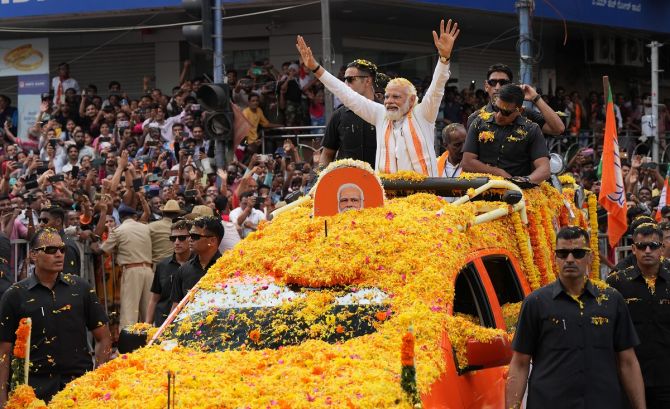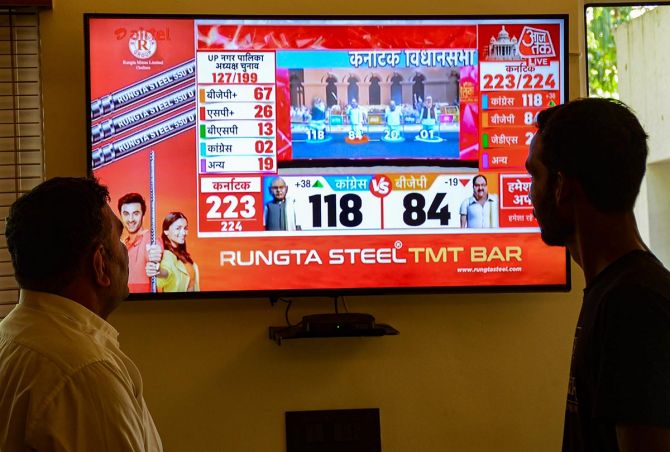The rising pitch of road shows and long rallies with hectoring pitches seem to have exhausted and numbed the audiences, rather than motivating them to vote for the party, observes Shreekant Sambrani.

So the shouting is finally over in Karnataka and the Bharatiya Janata Party -- read Narendra Modi -- electoral juggernaut has been halted in its stride, decisively it appears.
As of this writing, its finally tally could be in the low 60s in a House of 224.
That was the lowest of the exit poll forecasts. The agency and the channel which gave out that number would no doubt be thrilled by this boost to their bragging rights.
For the otherwise moribund Congress, this major victory in Karnataka, the second on the trot (after Himachal Pradesh) against Modi, would no doubt act as the much-needed adrenaline shot.
Whether that triggers a true revival process, we will know later in the year when two other states it rules (Rajasthan and Chhattisgarh) will hold assembly elections.
A curious thing happened just before Karnataka voted for its new assembly last Wednesday.
On Tuesday, May 9, The Times of India carried an edit page column by the noted international investment banker Ruchir Sharma.
The next day, the day of the election, it had an another edit page column by the well-known, if often controversial, economist Surjit Bhalla.
That same day, The Indian Express had an explanatory column by its staff expert Udit Mishra and an editorial on the Karnataka state economy.
All these highlighted Karnataka's exceptional economic progress in the last two decades, up to 2022.
They all used official data to show that the Karnataka had the second fastest rate of growth of the state GDP among all the large Indian states.
Its per capita state GDP was now the third highest in the country.
It had grown at 5.4 per cent per year since 1991, compared to the national average of 4.7 per cent.
Remarkably, Karnataka had also witnessed an increase in welfare spending, especially since 2019, according to Sharma.
This helped bring about a rapid reduction in poverty in the state.
While all three commentators used secondary data to arrive at their inferences, Sharma also used anecdotal points gathered during the extensive visit of the group of distinguished writers he leads in poll-bound areas (Shekhar Gupta, a member of that group, calls it Limousine Liberals).
The credentials of the three writers are impeccable.
Bhalla tends to lean towards the current ruling dispensation at the Centre, while Mishra tends to be critical of it.
Sharma brings in a unique comparative international perspective to his analysis. He has previously talked about miracle or break-out international economies, which included South Korea and Turkey at one time.
He has chosen to call Karnataka the miracle state economy of India.
Such a diverse group of erudite experts concurring on the economy of a state is a clear indication that their inferences may well be close to the truth.
[Parenthetically, some of my sources from Bengaluru vehemently insist that the state economy is far from being in the pink. They claim, on the basis of anecdotal evidence, that the after effects of the pandemic linger on and the further one goes from cities, the worse is the picture. While these sources do not have any political affiliation, they seem to be particularly antagonistic to any ruling combination.]

It might appear, therefore, the Kannadigas have never had it so good.
And we don't change horses midstream in boom times.
Yet this theme was missing from the relentless campaigning of the last month or so.
One can understand that the opposition Congress and the Janata Dal-Secular would not be very keen to use such metrics since they would put the ruling BJP in an advantageous position.
How (or rather, why) did the BJP's media super savvy propaganda machine fail to make use of it?
It is unthinkable that the campaign machinery led by Prime Minister Narendra D Modi was unaware of it.
Experience shows that even far smaller achievements have been totted up as miracles of the double-engine of growth.
True, Modi did talk of Karnataka being one of the leading states of the country, but he did not highlight many of the salient points our three commentators had listed -- higher education attainment among men and women, vastly improved condition and status of women, poverty reduction, improved housing, among others.
The most likely reason for this to have happened is that this was a defeat foretold.
Reports have been circulating since mid-2022 that the prime minister's office had received intelligence reports that the BJP was in imminent danger of being routed in Karnataka.
Some reports even speculated that the party tally may be restricted to around 60.
These reports gained credence following the suicide of a government contractor who left a note claiming that he was ending his life as he could not follow the pervasive practice of paying 40 per cent as the commission to politicians for getting any contract.
The resulting revulsion led to the trashing of the reputation of the Basavaraj Bommai government. No matter what the government did, the 40 per cent stain continued to spread to its every action.

That is possibly when the BJP brains trust decided that putting the economy as the main issue upfront was likely to cause more damage than good.
The party's playbook has a two-pronged strategy to deal with such situations -- use of Modi as the chief campaigner (and by extension, the main election issue) and an appeal to militant nationalism.
Since Karnataka is far removed from any border and had faced no real terror threat for some time, that translated into militant anti-Muslim propaganda.
The observance of the hijab, the glorification of Tipu Sultan and the small but significant reservation for Muslims were the three main issues on which the ruling party acted swiftly.
That did not quite pan out. The hijab issue went to the Supreme Court, which also stayed the removal of the Muslim quota. Tipu Sultan was never going to win elections single-handedly for the BJP.
Under the circumstances, the BJP had to face another economic fundamental law, that of diminishing returns.
The law we all learn in our Economics 101 says that any investment tends to bring in diminishing returns after a certain point, and may even lead to an actual decline thereafter.
That is what appears to have happened in the election campaign just ended.
The rising pitch of road shows (would it not be better to go back to the old term, procession?) and long rallies (again, why not call them public meetings?) with hectoring pitches seem to have exhausted and numbed the audiences, rather than motivating them to vote for the party.
The late-in-the-season Bajrang Bali issue was strictly for the faithful. It did not bring in any additional converts.

One final bit of historical evidence seems to have eluded the BJP top brass.
North Karnataka, formerly a part of the old Bombay state, was the area which nurtured the erstwhile Jan Sangh, the predecessor of the BJP when it was just a small shoot.
The BJP's present leadership was not even born when self-effacing cadres of young men and women dedicated themselves to life-long service of the Jan Sangh.
Many of them were also disciplined volunteers of the Rashtriya Swayamsevak Sangh.
Even today, North Karnataka has a disproportionately large representation in the RSS top rungs.
The style and manner of functioning of the current BJP leadership is quite different from the old guard volunteers of the Jan Sangh in this part of Karnataka.
The BJP has successfully adopted the strategy of retiring older leaders and workers and replacing them with hand-picked acolytes elsewhere in the country, especially in Uttar Pradesh and Gujarat.
It has been tried in Karnataka this time and has not met with the expected success.
One does not have to be a fan of Jagadish Shettar, a former chief minister, who was side-lined by the BJP, to see how this would rattle long-time votaries of the party in Karnataka.
But do not fear for a moment that the drama in Karnataka is over.
If there is one thing that the BJP values more than campaigning, it is regaining power by all possible means.
Remember Madhya Pradesh, and more recently, Maharashtra? So wait for the inevitable second act.
There are also two other consequences. The first is the fading off (finally!) of the JD-S.
Its self-proclaimed role as a possible kingmaker is now out of the script given the decisive verdict.
That is not altogether a bad thing, since the JD-S has been one of the worst examples of the all-in-the-family political firms.
The other is the inevitable long campaign later in the year for the three central Indian states of Rajasthan, Madhya Pradesh and Chhattisgarh. That would put the Karnataka campaign in the shade!
And then we head to 2024...
Ear plugs and eye shades, anyone?
Feature Presentation: Aslam Hunani/Rediff.com










